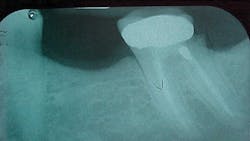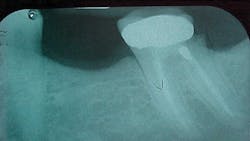What to do about poor-quality dentistry
Dear Dianne,
I work in a group practice with four general dentists. Three of the doctors do very nice dentistry and seem to take a lot of pride in their work. However, the other dentist does some of the worst dentistry I’ve ever seen. I’m talking about crown margins I could park my car under, composites that do not match, restorations that leak and fall out, and more. When this doctor checks my patients, I cringe when I have to reappoint them with him.
This dentist has been out of dental school for 10 years. Sometimes, I wonder how he ever graduated with such poor skills.
Don’t get me wrong—he’s a nice guy, but his dentistry sucks! I would not want him to even adjust a filling in my mouth. Several of my coworkers have noticed the poor quality of his dentistry as well.
My question to you is, what is my ethical obligation to my patients? Should I steer them away from his schedule? Should I say something to the senior doctor about what I’ve observed?
Northern RDH
Dear Northern,
As you are aware, hygienists are in the best position of all the staff members to judge the quality of a dentist’s work. With your instruments, you get to explore margins of restorations subgingivally, and you chart when you observe recurrent decay, failing restorations, or any other dental need. Hygienists certainly recognize when dentistry is high-quality or substandard.
Many hygienists are employed in offices where the dentists are fully engaged in advanced dental procedures that require many hours of continuing education. These dentists often push themselves to attain the precision needed to excel in those specialized areas. Some become over-the-top perfectionists who feel that all of their employees should have the same zeal as they do. Believe me, I know what I’m talking about. They have the bar set so high that nobody can please them. Staff turnover is common in these situations.
Figure 1: Grossly undercontoured crown margin
Then again, some hygienists find themselves employed by dentists who are content to just maintain the status quo. They are not interested in advanced procedures, and sometimes the quality of their dentistry is not so great. Often, they make up for their lack of skill with their great personalities, and patients and staff members love them.
Between these two extremes are the majority of dental practices where hygienists work with dentists who have varying levels of clinical skill, motivation, and business savvy. Hygienists who work in more than one office often observe a difference in the quality of each dentist’s work. Dentists, like hygienists, are not clones of one another, and some attain higher levels of skill than others. Just because someone graduated from dental or hygiene school does not mean that person will automatically be a highly skilled clinician. Excellence takes years to develop.
In your particular situation, there is no doubt in my mind that the other doctors are aware of their colleague’s lack of skill. I would even wager that they have had to redo some of this dentist’s work from time to time. There is no greater critic of a dentist’s work than another dentist.
Since I do not know the employment arrangement of the dentist in question, I will not speculate or offer opinions on what should be done. The dentist could be a partner, meaning he owns a part of the practice, or he could be an employee dentist.
Possible solutions include having one or more of the owners encourage him to take some remedial continuing education aimed at improving the quality of his work. Another solution would be to terminate his employment or buy him out. This is one of those situations that will likely come to a natural end if it continues.
What should you do? Nothing. I would not recommend having a conference with any of the other dentists to talk about what you have observed. As an employee in the practice, you haven’t observed the dentist in question doing anything illegal or unethical. Although his skill level may be lacking, he still completed dental school and passed his boards. If he continues to deliver substandard work, sooner or later there will be a series of patient complaints that may even result in a malpractice proceeding. My advice is to let his peers deal with the issue.
I would also advise you not to participate in any chatter among your coworkers about this doctor or the quality of his dentistry. To do so is unethical and could lead to more serious problems for you personally should negative remarks get back to the doctor. There could be personal problems in this doctor’s life that are affecting his ability to provide good dentistry. I mean, has his dentistry always been substandard, or has the quality deteriorated gradually? Could there be some underlying medical issue that is affecting his work? The truth is you do not know what is going on.
I also worked in a group practice for many years. When our patients needed restorative work, we let them choose which dentist they wanted to do their work. I think you should do the same and not try to steer patients in any particular direction. To do otherwise means you are putting yourself in a position of judgment, which is not a good place for you. Think about it. How would you like it if you found out that business assistants were steering patients away from your schedule? Frankly, you would be upset, as any clinician would.
Your analogy about the crown margin made me laugh. I remember having a new patient in my chair with the worst crown margin I had ever seen. The x-ray showed the crown margin was undercontoured and the tooth was sticking out on the distal by a wide distance (figure 1). My boss exclaimed, “Man, you could hide a dead dog down in there!” I still laugh when I think of that.
All the best,
DIANNE GLASSCOE WATTERSON, MBA, RDH, is an award-winning author, speaker, and consultant. She has published hundreds of articles, numerous textbook chapters, and three books. Dianne’s new DVD on instrument sharpening is now available on her website at wattersonspeaks.comunder the “Products” tab. Visit her website for information about upcoming speaking engagements. Dianne may be contacted at (336) 472-3515 or by email at [email protected].

